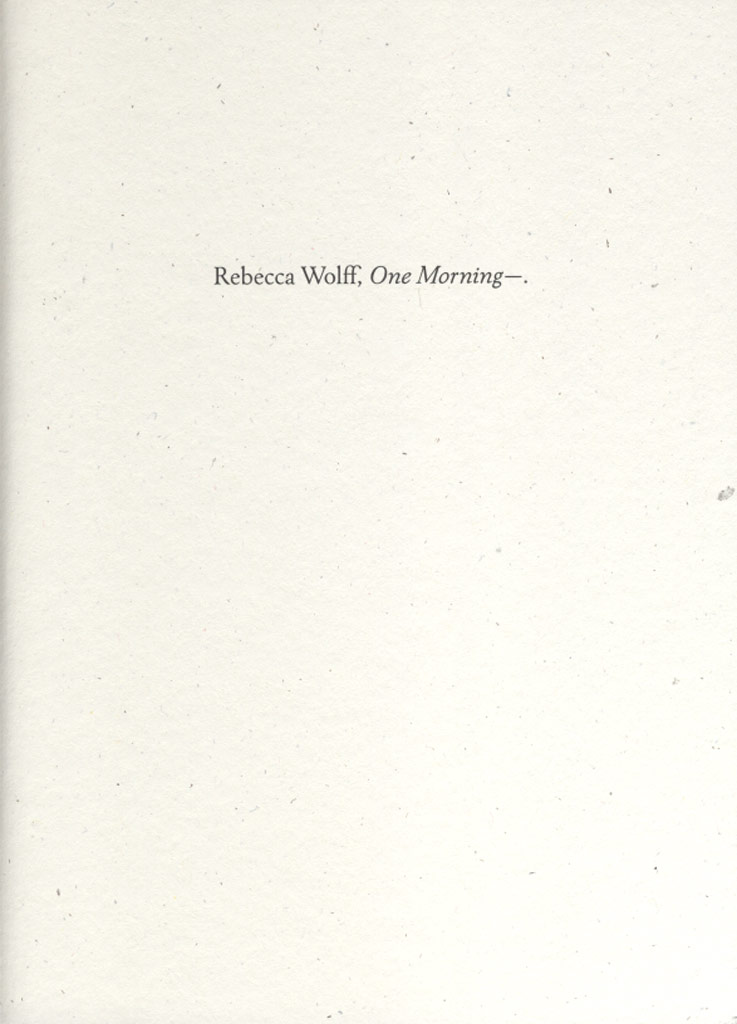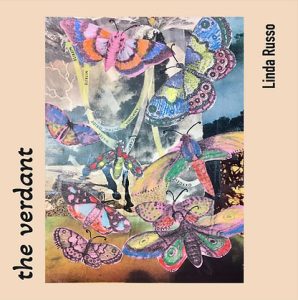One Morning—
Wolff’s One Morning— sat in my possession in a very raw state. The captivating parts of the poems were laid out and exposed. It was easy to see the mechanics and the utility of every phoneme and word. This is a highly refined piece of work from a woman very much in control of her craft. The level of Rebecca Wolff’s control shines through in the entire piece. There is juxtaposition in each sentence and stanza. “Traveller, / Your journey has been long // and sectional.” Those introductory lines in “Arcadia (et in . . . est)” bear the weight of repetition. They are full of heart and compassion, yet still quite cerebral. There are always dualities to be explored and explained. Wolff demonstrates the relation between the two as often as she can locate it: “By night everything seems impossible // By day, by extension, everything: possible.” Wolff’s One Morning— sat in my possession in a very raw state. The captivating parts of the poems were laid out and exposed. It was easy to see the mechanics and the utility of every phoneme and word. This is a highly refined piece of work from a woman very much in control of her craft. The level of Rebecca Wolff’s control shines through in the entire piece. There is juxtaposition in each sentence and stanza. “Traveller, / Your journey has been long // and sectional.” Those introductory lines in “Arcadia (et in . . . est)” bear the weight of repetition. They are full of heart and compassion, yet still quite cerebral. There are always dualities to be explored and explained. Wolff demonstrates the relation between the two as often as she can locate it: “By night everything seems impossible // By day, by extension, everything: possible.”
All of human relationships can be summed up with one fortunate line in the poem “The Reductions”: “Let’s go out and buy something.” In 2015, all of humanity is “In the sun,” shopping. The two are almost synonyms. The words seem arrived at incidentally. This is the mark of great poetry. The words lead themselves to truth. Wolff repeats phrases often in the poems until they begin to reach for deeper or higher; or until they begin to contort, like “From Where I’m Situated”:
Interspecies
me and future
me, me and me
in the past.
This addresses the movement and continuity of personality and people in a distorted manner. The word play from repeating “me” gets to shine in order to get the message across. In this manner the entire book of poetry is raw. The gears are exposed and the mechanics of what makes poetry are laid bare before the reader. In “Palisades” she asks us, “what would I tell you about it if I could?” Her answer:
Some poets find their place
in place
and naming it seems venture
somethat seems to me a tiresome—
This is to say, that laying meaning right on the surface and saying everything exactly as you mean it is shallow. Wolff wants to stand on the lines and words until they dissolve and reader and writer can float adrift.
But much of the work addresses topics like man boobs or obituaries in Vermont. They are lighthearted at times and fun in nature. Word play and technique seem to take the fore most of the time. This isn’t to say that Wolff never indulges the School of Quietude or that she delivers poems that showcase the epiphany of humanity. Even when she indulges the more mundane moments of life in word, there is a freshness that she brings to the experience through technique.
I could see her next move going in postpostmodern and Flarf poetry the way the poems rally against the traditional narrative piece. “Applies to Apple” is a good example in the natural derivation of words to create meaning. The title alone suggests how language has the capacity to move on its own with very little direction. A few pages later in “Fronting,” she states that “I front / because I can” which could be taken to represent her logic in keeping things in the cerebral heart of thoughtful poems.
Towards the end of the collection she gets a bit full circle. In “The Nightingale (sound of music)” she mentions:
I had an idea
in the middle of the nightand the confidence it brings me
is ongoing
This thought is pervasive through the whole book and works to her advantage. It gives her the ability to play with words and repetition until contortion is achieved, arriving at newer, richer, fresher meanings. “All day I was subsumed into the group,” she says in “Unfailingly” and all through this book I was subsumed into the technique.





